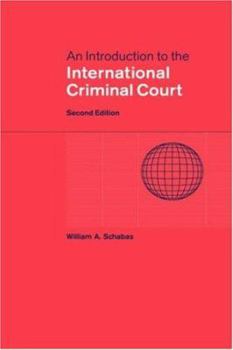An Introduction to the International Criminal Court
Select Format
Select Condition 
Book Overview
This is the authoritative introduction to the International Criminal Court, fully updated in this sixth edition. The book covers the legal framework of the Court, the cases that it has heard and that... This description may be from another edition of this product.
Format:Paperback
Language:English
ISBN:0521537568
ISBN13:9780521537568
Release Date:April 2004
Publisher:Cambridge University Press
Length:481 Pages
Weight:1.72 lbs.
Dimensions:1.2" x 5.9" x 9.0"
Customer Reviews
4 ratings
Really really great book
Published by Thriftbooks.com User , 15 years ago
As you have seen people here already have reviewed this book. I'll be very brief and just say that if you are interested in ICC this is your book!!! I will just say about the quality of the book: it's paper quality is very good, its not short, it's a bit wider than average books and for that reason it's not very thick, so you can carry with you and don't feel unfomfortable. In every sense, a great book....
Very helpful
Published by Thriftbooks.com User , 19 years ago
For this reviewer, who is definitely not a legal expert, this book was read with the goal of understanding to what extent pre-emptive wars can be viewed as `legal', to discover the reasons why the United States chose to withdraw its participation in the International Criminal Court, and to gain basic knowledge on the tenets and origins of international law in order to find out if indeed the current conflict in Iraq could be viewed as a `war crime' or some other severe violation of international law. Before reading this book, this reviewer was very unknowledgeable about legal concepts and reasoning in the context of international law, and had the opinion that international legal agreements were very fragile and tenuous. This view did not really change after reading the book, but its perusal did offer a few surprises and was thought provoking to a large degree. Like most legal treatises, this book suffers from the typical `tyranny of the footnote' that accompanies legal or history books. This minor annoyance that causes the flow of the reading to be disrupted is perhaps compensated by the need for the reader to know that the sources are available and that they can be checked if necessary. Readers who are not legal experts will no doubt think of the Nuremberg trials as being the best representative of what an international court can accomplish given the jurisdiction. Their biases in this regard are in fact true as is brought out many times in the book, particularly in the discussion on genocide and `crimes against humanity', which the Nuremberg trails were set up to deal with after the second world war. The word `genocide' apparently originated with Raphael Lewkin in 1944. Lewkin wanted to make sure that crimes against groups were prosecuted. It was later adopted in 1946 by the Nuremberg prosecutors and declared an `international crime' by the General Assembly of the United Nations. Genocide was to be distinguished from `crimes against humanity' since the latter was only to hold in the context of an international armed conflict. The author argues that the distinction is not really significant today, with `crimes against humanity' now referring to atrocities committed in wartime and in peacetime. However, genocide is to be distinguished from `crimes against humanity' and `war crimes' in that it must be committed with the `intent' of destroying a national, ethnic, racial, or religious group. It is this `special intent' the author argues, that makes genocide different from the other two crimes. According to the author, the designation of an activity as a `war crime' began with the 1907 Hague Convention IV and was refined in the 1919 Commission on Responsibilities. From then on says the author, "there is little argument about the existence of war crimes under international law." The Nuremberg charter listed as a war crime the murder or ill treatment of prisoners of war, the killing of hostages, the wanton destruction of cities, villages, or towns, a
A nice historical introduction
Published by Thriftbooks.com User , 21 years ago
I have attended author's lectures at Strasbourg. This book is a nice historical introduction about the ICC. I guess after the court is established and the Judges settle down on their chairs and volumes of case laws come out in Report form -- till then this book is a must read for everyone interested in this field.
Ignore Bush, Read This Book
Published by Thriftbooks.com User , 21 years ago
Schabas succeeds fully in introducing the reader to the main features of the new International Criminal Court (ICC). His book is a model of legal exposition. He writes clearly, situates the ICC within the history of international law, relates the substantive law of the ICC to the jurisprudence of the Yugoslavia and Rwanda tribunals, and has interesting comments on the negotiating history that led to the ICC. After finishing Schabas' book, I was struck most of all by the care and thought that went into the design of the ICC, which conforms to the main lines of international law as the law has developed since 1945. The ICC is the world's best hope for bringing war criminals, human rights violators, and genocidalists to justice. It is a disgrace that the U.S. has tried to smother it in the cradle. (I am a U.S. State Department official.)





